Net Zero, Energy and Transport Committee
Annual report of the Net Zero, Energy and Transport Committee 2024-25
Overview
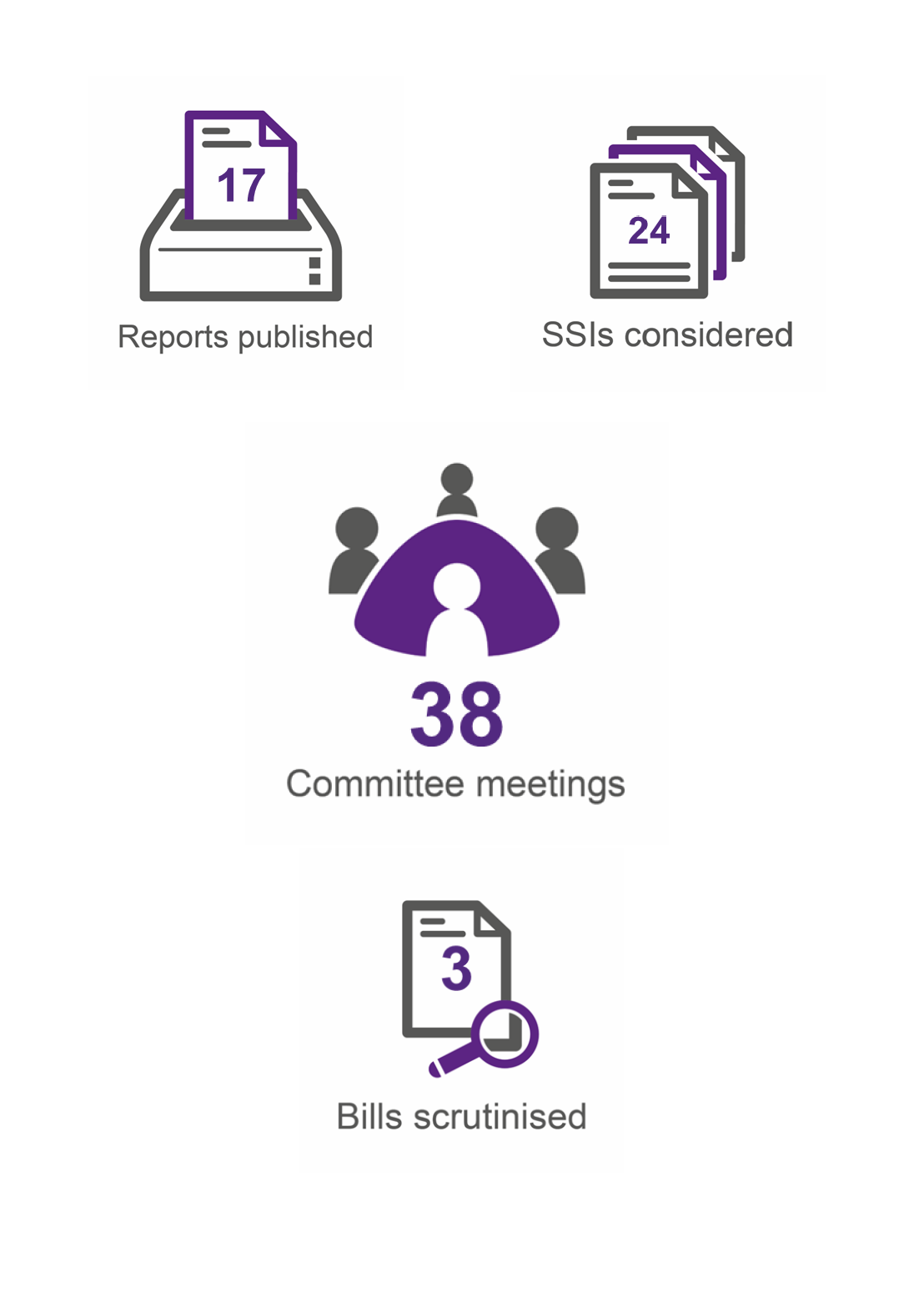
Introduction
This report covers the work of the Net Zero, Energy and Transport Committee during the Parliamentary year from 13 May 2024 to 12 May 2025. The Committee was established in June 2021.
The Committee's remit (as agreed by the Parliament on 26 June 2024, motion S6M-13795) is to consider and report on:
matters falling within the responsibility of the Cabinet Secretary for Transport;
matters falling with the responsibility of the Cabinet Secretary for Net Zero and Energy (with the exception of matters relating to the just transition); and
matters relating to land reform, natural resources and peatland, the Scottish Land Commission, Crown Estate Scotland and the Royal Botanic Garden: all of these within the responsibility of the Cabinet Secretary for Rural Affairs, Land Reform and Islands.
The following changes to the Committee's membership occurred during the course of this parliamentary year—
Members:
Ben Macpherson resigned from the Committee on 10 September 2024 and was replaced by Michael Matheson on 11 September 2024. Michael Matheson was then appointed as Deputy Convener of the Committee, replacing Ben Macpherson, on 17 September 2024.
Jackie Dunbar resigned from the Committee on 5 November 2024 and was replaced by Kevin Stewart on 6 November 2024.
Substitute Members:
Patrick Harvie replaced Maggie Chapman as the Scottish Greens substitute member on the Committee on 26 June 2024.
Ben Macpherson replaced Collette Stevenson as the Scottish National Party substitute member on the Committee on 11 September 2024.
Sue Webber replaced Graham Simpson as the Scottish Conservative and Unionist substitute member on the Committee on 6 November 2024.
The Committee thanks former Members for their contribution.
Meetings
The Committee met 38 times during the Parliamentary year. Four meetings were held entirely in private, 3 were held entirely in public, and the other 31 meetings included items taken in public and in private.
Examples of business which the Committee agreed to consider in private include:
evidence heard earlier during meetings;
consideration of possible witnesses for evidence sessions;
its work programme; and
draft reports.
Agendas and minutes of all meetings are published on the Net Zero, Energy and Transport Committee webpage at the Scottish Parliament website.
Legislation
Over the last year, the Committee has considered three Bills; the Circular Economy (Scotland) Bill, the Climate Change (Emissions Reduction Targets) (Scotland) Bill, and the Land Reform (Scotland) Bill.
Circular Economy (Scotland) Bill
The Bill was introduced on 13 March 2023 and was referred to the Committee for Stage 1 consideration. While Stage 1 consideration was undertaken in the last reporting period, Stage 2 was undertaken this reporting year. Stage 2 is when the Bill is subject to amendment in committee and this took place over 4 meetings from 7 May 2024 to 28 May 2024. There were a total of 207 amendments, a number of which delivered on Committee recommendations. For instance, one amendment provided a more robust "super affirmative" procedure for more important pieces of subordinate legislation which stem from the Bill.
Stage 3, a further amending stage followed by a debate and a vote on a motion to pass the final Bill, took place in the Chamber on 26 June 2024. The Bill became an Act on 8 August 2024.
Climate Change (Emissions Reduction Targets) (Scotland) Bill
In March 2024, the Climate Change Committee (CCC)—the independent advisor to governments in the UK on climate change policy—published its delayed 2023 Report to the Scottish Parliament on progress towards Scotland’s emissions reduction targets. The report concluded that the pace of emissions reduction required to meet the Scottish Government’s 2030 target “is now beyond what is credible.”
Following the CCC’s report, a Ministerial Statement was delivered to the Scottish Parliament on 18 April 2024. In this statement, the Scottish Government said it accepted “the CCC’s recent re-articulation that this Parliament’s interim 2030 target is out of reach,” and announced forthcoming “expedited legislation” to establish a revised timetable for achieving net zero by 2045. This was to avoid running into the legal duty to produce a draft climate change plan in relation to the 2030 target by November 2024.
The Climate Change (Emissions Reduction Targets) (Scotland) Bill was introduced on 5 September 2024. The main purpose of the Bill was to amend the Climate Change (Scotland) Act 2009 by replacing annual emissions reduction targets with a system of five-year carbon budgets.
Due to the expedited legislative timeline, the Committee held a pre-legislative call for views on the expected contents of the Bill prior to the summer recess, running from 5 July to 16 August 2024.
Following the Bill's introduction, the Committee held three evidence sessions on 10, 17 and 24 September 2024, hearing from a variety of stakeholders.
On 2 October 2024, the Parliament agreed motion S6M-14742, setting out an expedited timetable for the Bill.
The Committee's Stage 1 report on the Bill was published on 4 October 2024. The Scottish Government responded to the Committee's report on 9 October 2024 and the Stage 1 debate was held on 10 October 2024. After the debate the Scottish Parliament agreed by motion that the general principles of the Bill be approved.
The Committee undertook Stage 2 consideration of the Bill on 29 October 2024. There were 64 amendments to the Bill. Amendments agreed to included a number giving effect to Committee recommendations to enhance parliamentary scrutiny of climate change targets. Stage 3 took place on 5 November 2024, and the Bill became an Act on 22 November 2024.
Land Reform (Scotland) Bill
The Land Reform (Scotland) Bill was introduced on 13 March 2024. This wide-ranging and complex legislation proposes significant reforms across several areas, including land management, community engagement, the community right to buy, and the transfer of land. It also introduces a broad range of changes to agricultural holdings and small landholdings.
The Committee launched a call for views on 4 April that closed on 21 May, receiving 122 responses.
Between June 2024 and February 2025, the Committee held a total of 13 evidence sessions, hearing from a broad range of stakeholders, including legal experts, landowners, tenant farmer and crofting representatives, community and environmental organisations, land reform researchers and commentators, land management professionals, investors, and the Scottish Government. The Official Reports of all these sessions are available on the Bill's homepage.
As part of its Stage 1 Scrutiny of the Bill, the Committee conducted two visits:
Highland Perthshire on 23 September 2024– meeting with Atholl Estates, Oxygen Conservation and a group of local people identified through working with Aberfeldy Development Trust.
Langholm and Moffat area on 31 October/1 November 2024 – meeting with the Langholm Initiative , Newcastleton and District Development Trust, Buccleuch Estates, Gresham House, James Jones and Sons, and the Borders Forest Trust.
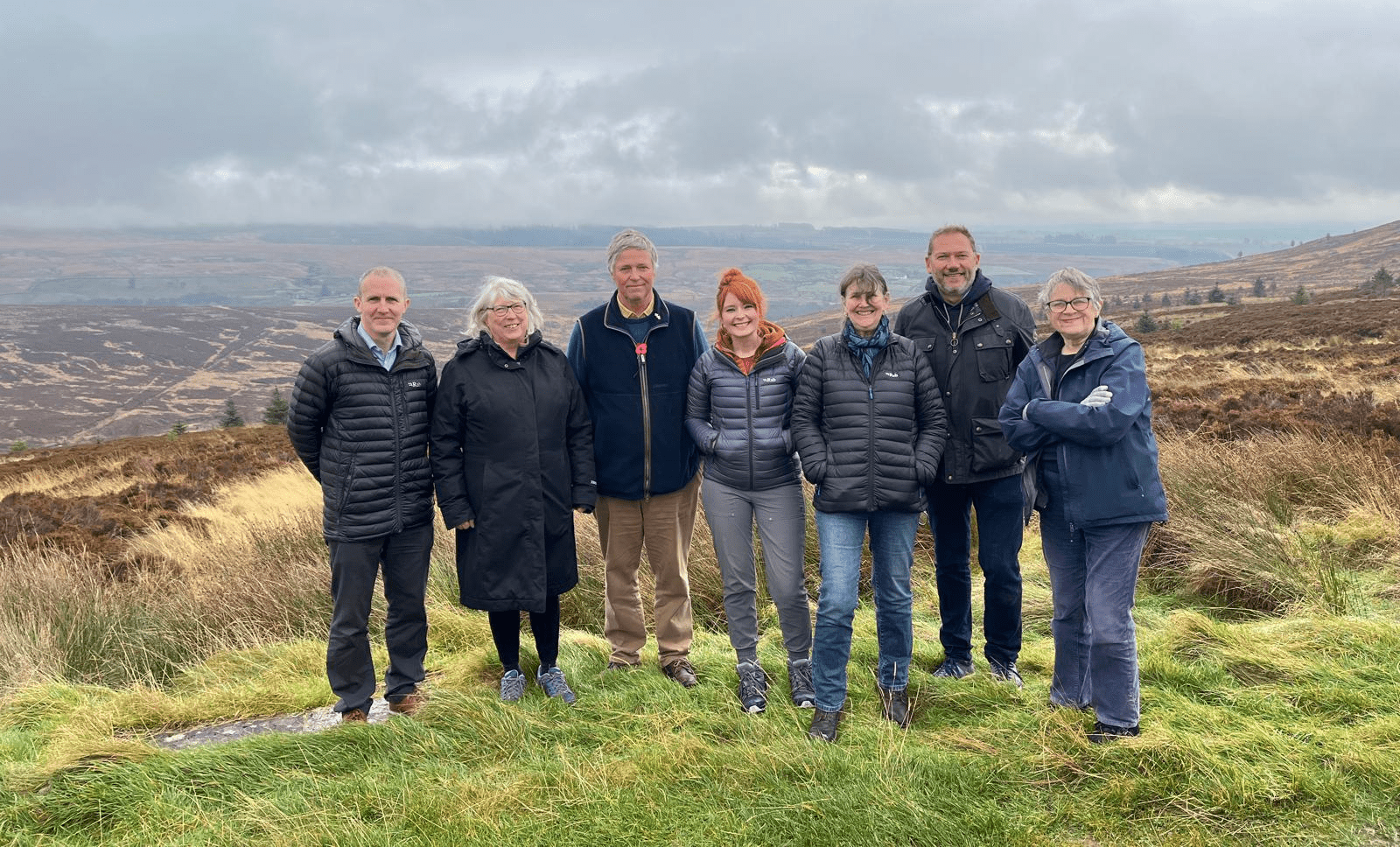
Committee members on the community-owned Tarras Valley Nature Reserve as guests of the Langholm Initiative
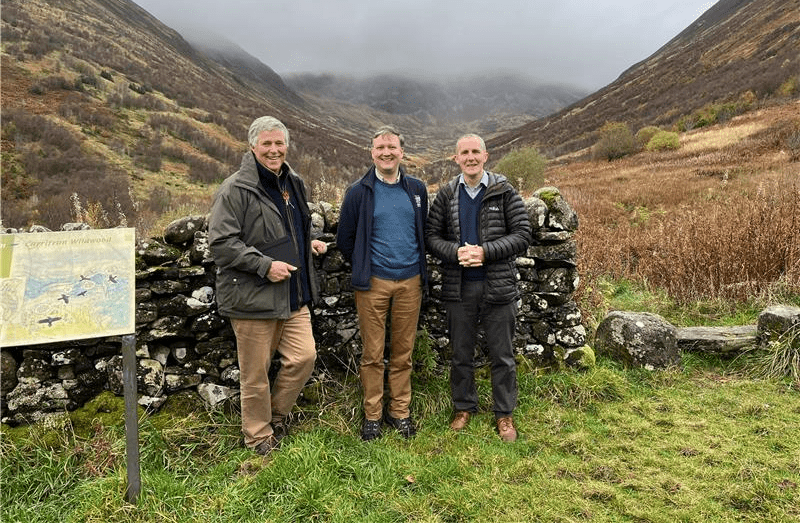
Committee members visit the Borders Forest Trust at Carrifran Wildwood
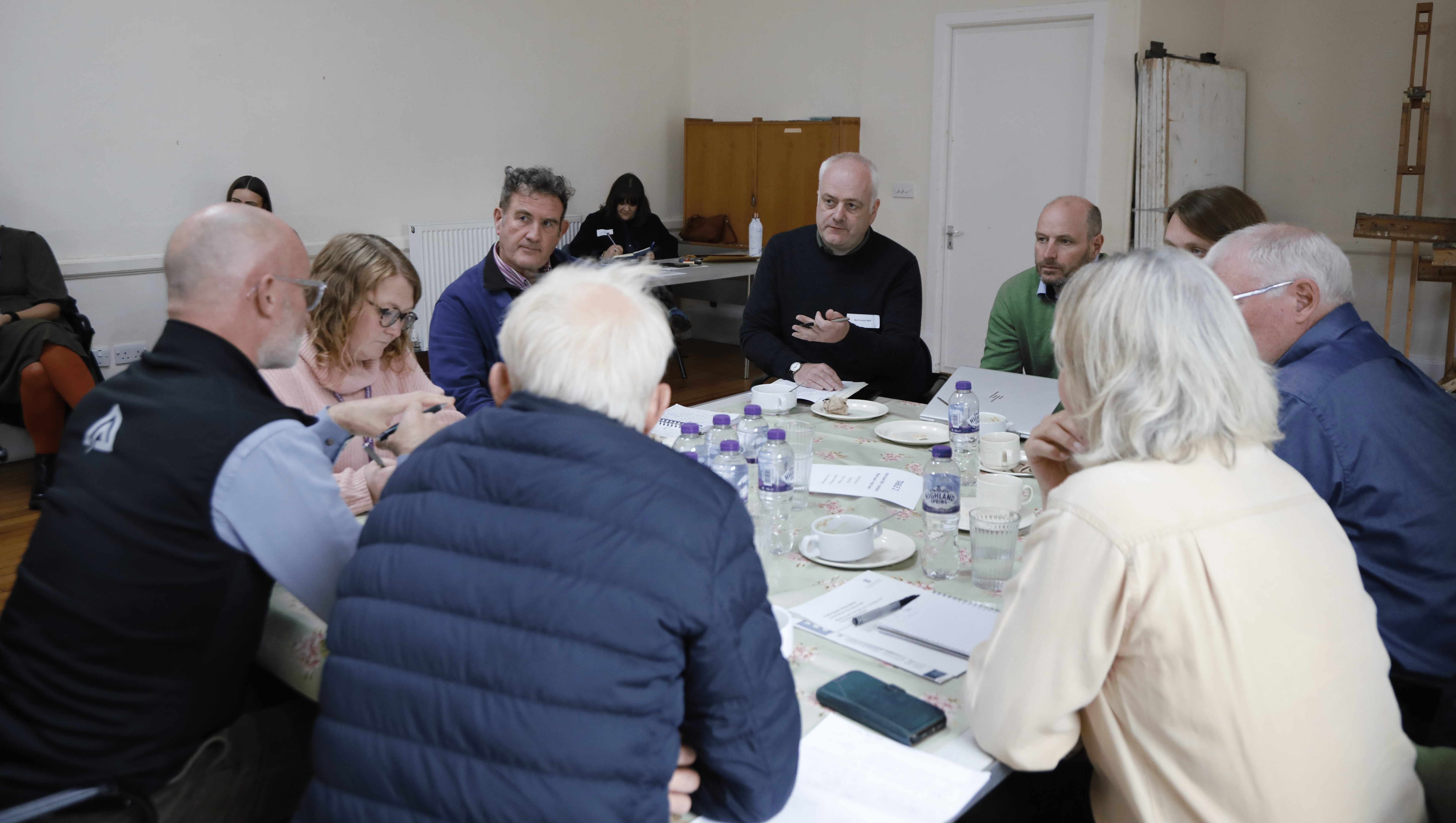
Members discussing the Land Reform (Scotland) Bill at the Aberfeldy Town Hall event
The Committee held two further engagement events to gather views on the Bill:
Royal Highland Show panel on 21 June 2024 – the Convener hosted a panel event with Q&A from audience members.
Tenant Farmers focus group 22 January 2025 –the Committee heard from a group of 12 tenant farmers (split into 2 groups for discussion) identified through discussions with the Scottish Tenant Farmers Association, NFU Scotland and the Nature-Friendly Farming Network.
The Committee published its Stage 1 report on the Bill on 19 March 2025, and the Scottish Government responded to the Committee’s report on 25 March 2025. The Stage 1 debate was held on 26 March 2025. After the debate, the Scottish Parliament agreed by motion that the general principles of the Bill be approved.
Stage 2 proceedings, when the Bill is subject to amendment, will begin in June.
Scottish Statutory Instruments (SSIs)
Scottish statutory instruments are proposed new laws laid under the authority of existing primary legislation (the "parent Act"). The Parliament has a short period of time in which to consider whether they should become law. During the Parliamentary year, the Committee considered:
8 affirmative instruments
13 negative instruments
All of the Committee's SSI reports can be read at the Scottish Parliament website.
Additionally, 3 'laid-only' instruments (i.e. subject to no procedure) that were laid in the Parliament fell under the Committee's remit.
Notable examples of the Committee's scrutiny of subordinate legislation included the Environmental Protection (Single-use Vapes) (Scotland) Regulations 2024 and the Environmental Authorisations (Scotland) Amendment Regulations 2025.
The Environmental Protection (Single-use Vapes) (Scotland) Regulations 2024
In June 2024, the Scottish Government laid the Environmental Protection (Single-use Vapes) (Scotland) Regulations 2024. The purpose of these regulations was to ban the sale and supply of single-use vapes in Scotland, with the overarching policy aim of reducing the environmental harm caused by these types of products.
To support the Committee's scrutiny of the regulations, the Committee wrote to a range of stakeholders to better understand the environmental and health implications of a potential ban. The Committee also engaged with business groups like the Scottish Retail Consortium to understand how the ban might affect retailers.
In recommending the instrument be approved, the committee acknowledged the compelling evidence of significant environmental challenges associated with the disposal of single-use vapes, which are incompatible with the Scottish Government’s circular economy goals.
The Committee also highlighted stakeholder concerns that new product developments could undermine the ban, recommending that the Scottish Government continuously review the definition of these devices as part of broader product stewardship policies to "future-proof" the regulations.
The Environmental Authorisations (Scotland) Amendment Regulations 2025.
In November 2024, the Scottish Government laid the Environmental Authorisations (Scotland) Amendment Regulations 2025. The purpose of these lengthy and complex regulations was to amend the Environmental Authorisations (Scotland) Regulations 2018 to bring the regulation of industrial and other emissions activities, waste activities, and water activities into a single "Integrated Authorisation Framework".
To allow additional time for scrutiny, the Committee took the unusual step of requesting that the Scottish Government withdraw the regulations and re-lay them in the New Year. The Scottish Government agreed that additional time for consideration would benefit both the Committee and stakeholders, and accordingly withdrew the regulations, re-laying them on 27 February 2025. The Committee welcomed the Government’s cooperation and its willingness to take this step, which significantly improved the Committee’s ability to conduct scrutiny.
The Committee ultimately recommended that the instrument be approved, recognising it as a positive step towards raising environmental standards, closing regulatory gaps, and helping to level the playing field across sectors.
Proposals for UK Statutory Instruments (UK SIs)
In some cases, the Scottish Parliament has the opportunity to consider whether it agrees with decisions by the Scottish Government to consent to provision within devolved competence being made via UK statutory instruments. This procedure is governed by the Statutory Instrument Protocol, which was developed and agreed by the Scottish Parliament and Scottish Government in response to Brexit and applies in relation to policy areas previously covered by EU Law.
During the Parliamentary year, the Committee received:
6 'Type 1' consent notifications
0 'Type 2' consent notifications
Type 1 notifications require the Scottish Government to seek the approval of the Scottish Parliament of a proposed decision to grant consent to UK Ministers making provision in a devolved area.
Type 2 notifications are notified to the Scottish Parliament after the Scottish Ministers have given their consent to UK Ministers. These are limited to instruments of a technical nature that do not make policy changes.
Legislative Consent Memorandums
A Legislative Consent Memorandum (LCM) is lodged in relation to any Bill in the UK Parliament that proposes to legislate on devolved matters, change the legislative competence of the Scottish Parliament, or change the executive competence of the Scottish Ministers. UK Bills meeting any of these criteria should not normally be passed without the consent of the Scottish Parliament. The Scottish Government must lodge an LCM for any such Bill so that the Parliament can scrutinise whether consent ought to be given.
During the Parliamentary year, the Committee was designated lead committee for scrutiny of three LCMs and two supplementary LCMs.
Passenger Railway Services (Public Ownership) Bill
On 3 September 2024, the Committee considered an LCM on the Passenger Railway Services (Public Ownership) Bill. This Bill, now an Act, will bring rail passenger services into public ownership on termination of any existing franchise contracts. The Bill as introduced comprised four clauses and a schedule. The LCM set out the Scottish Government’s position that all of these require the consent of the Scottish Parliament as they alter the executive competence of the Scottish Ministers. The Committee's report, published on 9 October 2024, recommended that the Parliament approve the legislative consent motion.
Great British Energy Bill
On 7 January 2025, the Committee considered an LCM on the Great British Energy Bill. This Bill (now an Act) will enable the Secretary of State to designate a company as Great British Energy and place it on a statutory footing. Great British Energy will be an operationally independent company wholly owned by the Government. Its objectives will be to facilitate, encourage and participate in the production, distribution, storage and supply of clean energy; the reduction of greenhouse gas emissions from energy produced from fossil fuels; improvements in energy efficiency; and measures for ensuring energy security.
A supplementary Legislative Consent Memorandum (LCM) was lodged on 28 January. It stated that all clauses of the Bill required the consent of the Scottish Parliament, although some had greater implications for devolved matters than others. In particular, Clauses 3, 4, 5, and 6 were considered by the Scottish Government to be more substantive and to require consent because they related directly to devolved areas. The supplementary LCM also noted that inter-governmental discussions had focused on Clauses 5 and 6. It confirmed that amendments had been lodged to Clause 5 and that reassurances had been provided in relation to Clause 6, with which the Scottish Government was content.
The Committee's report considered the original and supplementary LCM and was published on 4 February 2025. The report recommended that the Parliament agrees to the proposed legislative consent motion.
A second supplementary LCM was then lodged on 17 February 2025 and considered by the Committee on 19 February 2025. A short report was agreed and published the same day, reflecting that the Committee did not have time for proper scrutiny in which to reach an informed position on the Bill. The report raised concerns about the effect of late amendments raising devolution issues on the LCM process and "the risk of the Scottish Parliament being left as a "bystander" to the legislative consent process for UK Bills".
The Scottish Government lodged a third supplementary LCM on 24 February 2025 but due to time constraints the Parliament agreed, to suspend Rule 9B.3.5 of Standing Orders . The Committee was therefore not required to report on this memorandum.
The Committee raised concerns about flaws in the LCM process that the experience of scrutinising this Bill had highlighted in letters to the Constitution, Europe, External Affairs and Culture Committee, Standards Procedures and Public Appointments Committee, and the Leader of the House of Commons. The Committee’s principal concern was that meaningful scrutiny is often not achievable when amendments with devolved implications are lodged late in the legislative process at Westminster.
Planning and Infrastructure Bill
On 27 March 2025, the Scottish Government lodged an LCM on the Planning and Infrastructure Bill. This Bill primarily relates to housing development and infrastructure projects across England, but two main elements require the consent of the Scottish Parliament: a new system of consents for electricity infrastructure (clauses 14-20) and provision about fees for applications for harbour orders (clause 42). The Committee considered its approach to scrutiny of the LCM on 22 April and agreed to issue a targeted call for views. The Committee will take evidence on the LCM imminently, with the aim of reporting to parliament before the summer recess.
Inquiries and other short-term or rolling scrutiny work
Ferry Services in Scotland
Over the past year, the Committee has continued to monitor the construction of two ferries at Ferguson Marine Port Glasgow (FMPG), a company owned by the Scottish Government. This work has focused on tracking the rising costs associated with these vessels, the timelines for their introduction, and the resulting impact on ferry services.
The Committee's work in this area has included written correspondence and taking formal evidence from key stakeholders, including an evidence session with FMPG on 26 November 2024 and with Caledonian Maritime Assets Ltd (CMAL) on 7 January 2025. The Committee also receives quarterly updates from both FMPG and CMAL, which are published on its website.
Scotland's train and bus services
In April 2025, the Committee undertook a series of stock-take evidence sessions looking at the challenges facing Scotland's rail and bus sectors.
On 22 April 2025, the Committee took evidence from representatives of bus and rail passengers and staff, across two panels. On 29 April 2025, the Committee took evidence from rail and bus operators and owners and rail freight representatives, over two panels.
The Committee will continue to keep a watching brief over these sectors for the duration of the parliamentary session and is likely to make use of the evidence heard during these sessions to support future scrutiny, including of the draft Climate Change Plan expected later in 2025, and in making recommendations on the 2026-27 Scottish budget.
Environmental governance
The Committee has continued its scrutiny of post-Brexit environmental governance arrangements in Scotland. This followed the publication of a June 2023 Scottish Government review of the effectiveness of environmental governance in Scotland. Production of the report was a requirement of the UK Withdrawal from the European Union (Continuity) (Scotland) Act 2021 (‘the Continuity Act’). In accordance with further provisions from the Continuity Act, the Scottish Government also launched a consultation on its assessment of environmental governance and laid a statement before the Scottish Parliament responding to the consultation on 19 November 2024.
The Committee had previously considered written views and oral evidence from key stakeholders on this matter. The Committee followed this up by taking evidence on the 19 November statement from the Acting Cabinet Secretary for Net Zero and Energy , and the concerns raised by stakeholders. This session was held on 10 December 2024.
One of the key issues that arose in the Committee's scrutiny was Scotland's lack of compliance with the Aarhus Convention. Given this was something that the Equalities, Human Rights and Civil Justice Committee had also considered, the Committees agreed to hold a joint debate on this issue. This took place in the Chamber on 3 April 2025.
Annual check-ins with the Scottish Government
Given the wide scope of the Committee's remit, the Committee agreed at the outset of the session that it would be helpful to have annual check-in sessions with the Scottish Government to get updates on relevant policy developments. This approach also allows the Committee to explore topical issues and consider how the Scottish Government budget is being spent. On 4 June 2024, the Committee heard from the Cabinet Secretary for Transport on the Scottish Government's transport policies and performance and on 28 May 2024, the Committee heard from the Cabinet Secretary for Net Zero and Energy on climate change and environmental governance.
Budget scrutiny 2025-26
For the 2025-26 Scottish Government Budget, the Committee's scrutiny focused on:
Monitoring how the Scottish Government's requirement to achieve a just transition to net zero by 2045 is reflected in Budget spending; and
How the Scottish Government's spending in 2024-25, and longer-term spending plans, align with the Climate Change Committee's “balanced pathway” to net zero.
In early July 2024, the Committee wrote to every Scottish Government Cabinet Secretary to ascertain how they are ensuring that they meet the Scottish Government’s overriding net zero goals. These letters and their responses are available on the Committee correspondence webpages.
The Committee took evidence from the Scottish Government on the 2025-26 Budget over two meetings in January:
The Committee’s pre-budget scrutiny letter focused on:
the Scottish Government's approach to policy making and prioritisation, as well as wider governance arrangements; and
spending for those sectors highlighted by the CCC where progress is lagging and where more targeted action is needed to accelerate change.
The Scottish Government responded to the Committee’s letter on 4 December 2024.
Appointments
Over the last year, the Committee has considered appointments made to the Scottish Land Commission (SLC), the Tenant Farming Commission and Environmental Standards Scotland (ESS).
While these appointments are made by the Scottish Government, they must be approved by the Scottish Parliament. The Committee was tasked with considering the proposed appointments and recommending to the Scottish Parliament whether they should be approved.
Appointment of Scottish Land Commissioners and the Tenant Farming Commissioner
The Cabinet Secretary for Rural Affairs, Land Reform and Islands wrote to the Committee on 15 April notifying that the tenure of three SLC Commissioners, including the Tenant Farming Commissioner, would end in December 2024.
On 17 October 2024, the Scottish Government wrote to the Committee setting out its nominees—
Dr Lucy Beattie (Land Commissioner)
Dr Calum MacLeod (Land Commissioner)
Robert Black (Tenant Farming Commissioner)
To assist the Committee in making a recommendation to the Parliament on the candidates for nomination, the Committee held an evidence session with the candidates on 12 November 2024.
The Committee agreed to recommend that the Scottish Parliament approve the three candidates.
Appointment of the Chair of Environmental Standards Scotland
Jim Martin stood down as ESS's first Chair on 31 March 2024. On 18 February 2025, the Committee held an evidence session with the Scottish Government's nominee for the the position, Dr Richard Dixon. Following the evidence session, the Committee agreed to recommend approval of the appointment to the Parliament.
Statutory bodies and Regulators
The Committee aims to hold regular check-in sessions with statutory bodies and regulators within its remit. These sessions tend to focus on the organisation's annual report and accounts, but also provide an opportunity to discuss performance more generally and relevant topical issues.
Over the reporting period, the Committee heard from:
25 February 2025 - Scottish Environment Protection Agency
Hydrogen aspects of Project Willow
As this reporting year nears its end, the Committee has just begun work to gather evidence on the proposed hydrogen-related developments at Grangemouth.
On 12 September 2024, Petroineos announced plans to convert its Grangemouth refinery into a fuel import terminal, citing declining profitability and the significant investment required to maintain refining operations. Petroineos is a joint venture between PetroChina International London (PCIL) and the INEOS Group.
Subsequently, on 29 April 2025, it was confirmed that crude oil processing at the refinery had ceased, resulting in the loss of approximately 430 jobs. The refinery forms part of the larger Grangemouth industrial complex, which employs around 2,000 people.
In autumn 2024, Petroineos commissioned a £1.5 million feasibility study to explore future uses of the site as a low-carbon energy hub. The initiative—code-named Project Willow—received joint support from the UK and Scottish Governments. The study's findings were published on 19 March 2025.
Project Willow outlines nine potential projects for the site, with the Committee choosing to focus scrutiny on Projects 6 to 9, which involve the use of low-carbon hydrogen technologies.
Over two meetings in May, the Committee will gather evidence on the proposed hydrogen-related developments at Grangemouth.
Petitions
The Committee has considered one petition over the reporting period, PE2123. The petition, proposed by Asthma + Lung UK Scotland, calls on the Scottish Parliament to urge the Scottish Government to amend the Air Quality Standards (Scotland) Regulations 2010 by setting new limit values for nitrogen dioxide and fine particulate matter which align with the World Health Organisation air quality guidelines published in 2021.
The Committee discussed its approach to the petition at its meeting on 1 April 2025 and agreed to write to the Scottish Government to get an update on its review of the CAFS2 strategy. The Scottish Government responded on 22 April. The Committee will continue to scrutinise the petition over the remainder of the parliamentary session.
Advisers
The role of a committee adviser is to support committee scrutiny by providing expert knowledge and/or experience in a particular policy area. Advisers are usually appointed to support a specific inquiry or discrete piece of work, such as a Bill. But advisers can also be appointed to provide advice on a specific aspect of a Committee’s remit over a longer timescale – spanning multiple inquiries or bits of work, or being appointed as a “standing” adviser for the whole session.
The Committee has retained the services of two standing advisers over the last year:
Professor Colin Reid, Emeritus Professor of Environmental Law, University of Dundee: adviser on environmental standards and regulation in a post-Brexit context (October 2022 to the present)
Dr Kirsten E H Jenkins, Senior Lecturer in Energy, Environment and Society, the University of Edinburgh: adviser on climate change and net zero targets (January 2024 to the present)
Equal opportunities and Committee outreach
Scotland's train and bus services
As part of its work examining the challenges facing Scotland's rail and bus sectors, the Committee sought to understand the lived experience of service users—particularly young people, who often rely on public transport for education, work, and social connection.
On 22 April 2025, the Committee heard from Islay Jackson MSYP, Deputy Convener of the Transport, Environment and Rural Affairs Committee at the Scottish Youth Parliament. Islay shared her perspective on the barriers young people face when using public transport, including issues of affordability, reliability, and accessibility—including in rural and island communities.
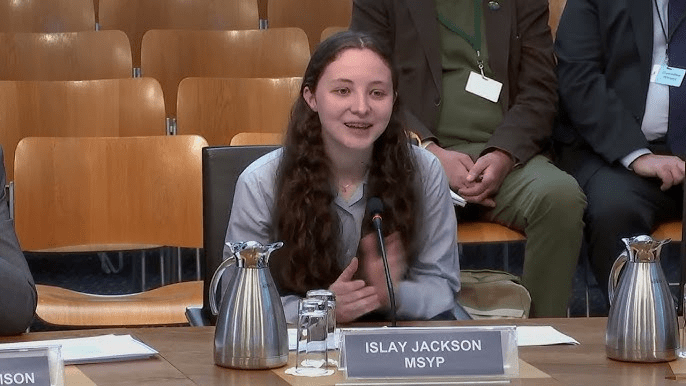
Islay Jackson MSYP giving evidence to the Committee
Land Reform (Scotland) Bill
As part of its Stage 1 scrutiny of the Land Reform (Scotland) Bill, the Committee undertook a range of engagement activities to gather views from individuals and groups with an interest in land issues.
One such activity was a “town hall”-style event held at the Royal Highland Show, attended by approximately 60 attendees from a variety of backgrounds, all sharing a common interest in land reform. The event opened with brief statements from a panel of speakers who shared their general impressions of the Bill. Attendees were then invited to put questions to the panel, prompting a wide-ranging discussion. Topics raised included fundamental concerns about inequalities in land ownership, the potential advantages and disadvantages of large-scale landholdings, and more detailed questions on the provisions of the Bill.
The Committee also hosted an online engagement session specifically for tenant farmers. This session was designed to hear directly from a group directly affected by the proposed reforms who may not feel comfortable sharing views publicly due to sensitivities around some landlord-tenant relationships. The online format proved to be an inclusive method of engagement, allowing the Committee to gather views it may not otherwise have heard.

The Convener speaking at the Royal Highland Show
Arctic Circle Assembly
Monica Lennon and Ben Macpherson attended the Arctic Circle assembly in Reykjavik in October 2024, as part of a delegation led by Presiding Officer Alison Johnstone. This is the third time in this Parliamentary Session that the Committee has been represented at the Assembly, the world’s largest forum on the Arctic and near-Arctic region.
This year, the delegation led a well-attended breakout session on Scottish and Nordic parliamentarians’ views on private finance and natural capital, discussing what Scotland needed to do to restore its forests and peatlands in particular, and the role of Parliamentarians in mediating competing policy priorities and views in relation to effective land use and nature restoration. The delegation had meetings with various Ministers, Parliamentarians and policymakers, including Conference Chair and former Icelandic President Ólafur Ragnar Grímsson and Kristina Hafoss, Secretary General of the Nordic Council. They also visited the Icelandic Parliament, the Althing, and had dinner with the Althing's Environment and Communications Committee.
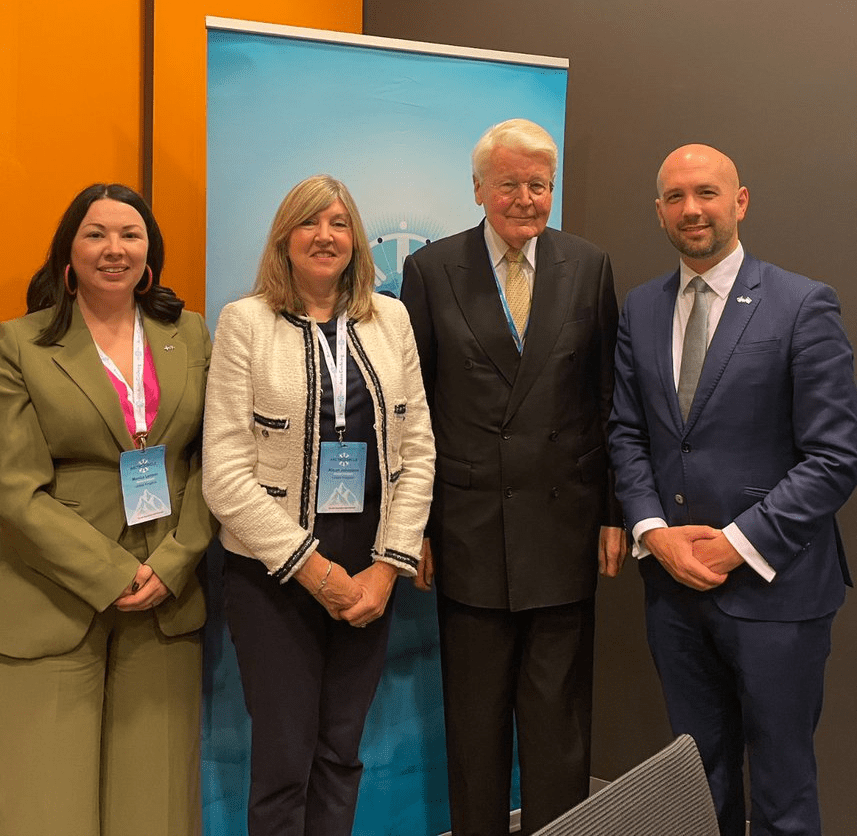
Committee members and the Presiding Officer meeting with the Arctic Circle Assembly Chair, Ólafur Ragnar Grímsson
Climate Change People's Panel
Last year, the Committee established a People's Panel to support its post-legislative scrutiny of section 91 of the Climate Change (Scotland) Act 2009 . This provision relates to a Scottish Government obligation to create a public engagement strategy on climate change and refresh it every five years. The Scottish Government has said it will conduct a mid-term review of the strategy in 2024.
A People’s Panel is a form of deliberative democracy where members of the public can discuss and express their views with the aim of influencing decision-making of a certain issue. The Panel was comprised of twenty three members of the public that were broadly a cross-section of Scotland’s population. The Panel was tasked by the Committee with considering two questions:
How effective has the Scottish Government been at engaging the public on climate change and Scotland’s climate change targets?; and
What else (if anything) could the Scottish Government do to inform and involve the public to help meet Scotland’s climate change targets?
Participants produced a set of recommendations that were incorporated in a report and then presented to the Committee at a public evidence session on 16 April 2024. It is intended that the recommendations will feed directly into the Committee’s scrutiny of the Climate Change (Scotland) Act.
In May 2025, the Acting Cabinet Secretary for Net Zero and Energy wrote to the Committee to provide an update on the Scottish Government’s mid-point progress review of the Public Engagement Strategy for Climate Change, which included a detailed response to the panel's recommendations. In her letter the Acting Cabinet Secretary noted that the People’s Panel “were an important source of evidence for this review”.